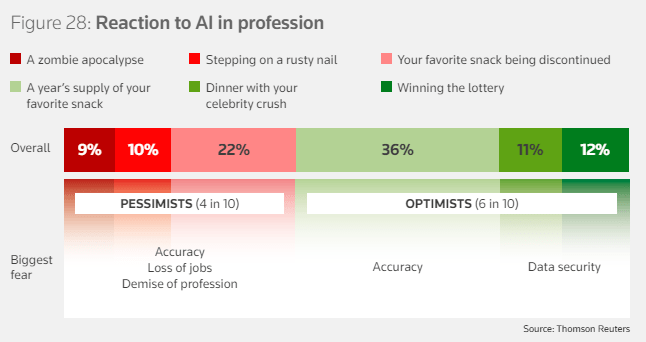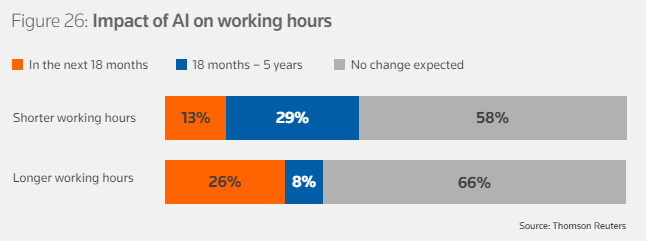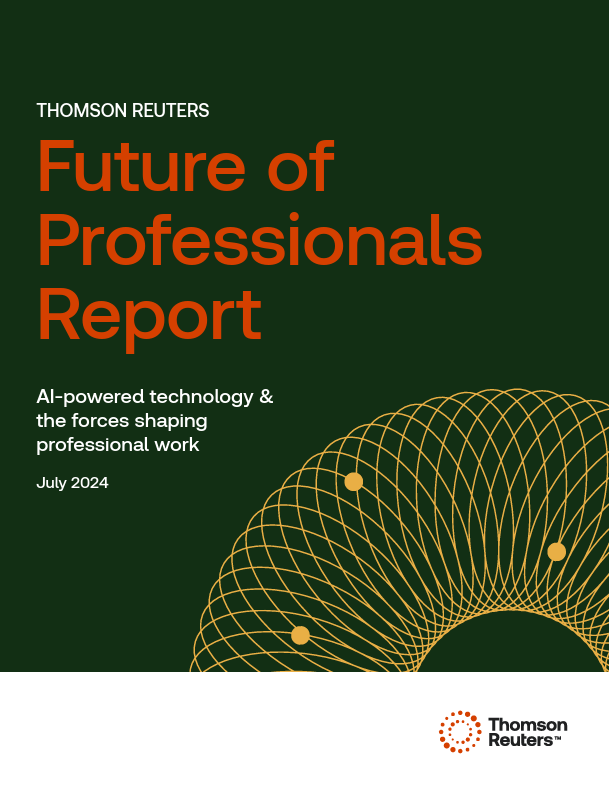The rise and evolution of artificial intelligence (AI) is ushering in a new era for business. It is impacting companies across all industries and their employees. And while much of the buzz has revolved around evolving ethical and regulatory issues related to AI, one potential benefit that should not be overlooked is AI’s impact on mental health and well-being.
The reality is that many of today’s professionals are stressed and burned out. Accounting professionals are no exception. While it is true that the industry professionals has long been associated with high-risk work and ever-changing laws and regulations, the call for more efficiencies in performing work and a better work-life balance has perhaps never been louder.
To shed more light on the role that AI can play in helping to improve the mental health and well-being of today’s professionals, Thomson Reuters surveyed more than 1,200 individuals working in the tax and accounting, legal, global trade, risk, and compliance fields to get their insights. Some may find the results of the Future of Professionals report to be surprising.
Jump to ↓
| Impact of AI on well-being |
| Reduce risks with AI to improve well-being |
Impact of AI on well-being
Every profession has stress and risks. Accounting is a high-pressure job that has long been associated with stressful tax seasons and long hours. Risk management has to make sure everything is secure all the time. Lawyers at times need to work long hours for each case. Today’s complex and competitive business environment, against the backdrop of rising inflation and economic uncertainties, has only added to the pressure and industry professionals are looking for more meaning in their work.
Now throw into the mix greater client demands and expectations, and inefficient tools and resources. For many professionals, the feelings of stress and burn out are all too real and it is taking a toll on their well-being.
Some within the profession are also concerned about the impacts that AI may have on the industry.
When professionals were asked in the report to imagine how they would feel if a time traveler from 10 years into the future told them that AI would become ubiquitous in their profession, 22% of respondents equated the scenario with their “favorite snack being discontinued.” This is, of course, a playful take on their reaction to AI, but their worries are not to be taken lightly.

Change can be scary and fear of the unknown can impact one’s mental well-being. Anxiety and stress over job loss and displacement are notable and are commonly cited concerns. There is also worry about the negative impacts that AI may have on mental well-being and work-life balance. In fact, 26% of survey respondents believe that AI may lead to longer working hours.
Those professionals with pessimistic views of AI also highlighted the “potential of less-rewarding work because there is less of a ‘personal touch of an advice-centric organization,” the reported noted.
Thomson Reuters Institute
In today’s increased remote or hybrid work environment, there can be less human interaction and some may already be feeling that there’s a decline in the quality of interpersonal relationships. AI, they fear, may further exacerbate the disconnect.
When there’s a fear of job loss and a feeling that one’s professional capabilities are not realized or not valued, it erodes engagement. And connecting the dots between work and mental health and well-being is easy.
Reduce risks with AI to improve well-being
According to the report, 28% of the professionals said their work had a strongly or moderately negative impact on their mental health and well-being. Long working hours was among the top factors driving perceptions of negative mental health and well-being.
Despite the concerns of AI negatively impacting the industry and the mental health and well-being of professionals, there remains a significant dose of optimism around AI.
The most common reaction to AI is cautious optimism, kind of like having “a year’s supply of your favorite snack” — as it was equated to by 36% of those surveyed.
From driving greater efficiencies, to quickly analyzing vast amounts of data, to aiding in research, the hopes and potential for AI are undeniable.
The majority of professionals (80%) said that long working hours and worry of making a mistake or missing a critical detail each currently have a negative impact on their mental health. However, with the efficiencies to be gained through the widespread use of AI, such concerns can be directly addressed and mitigated.
Professional mental health concerns will ease, with associate burnout and [high-risk work] hopefully relegated to the past, as working hours reduce, flexibility becomes the norm, and room for human error is removed.
Thomson Reuters Institute
Furthermore, the efficiencies gained through AI can increase capacity and broaden mental bandwidth. This will provide professionals with more free time to spend on higher-value, higher-touch work.

So, what about a fear of job loss? This concern can take a toll on one’s mental health and well-being. Therefore, it is critical that firm leaders and in-house functions clearly communicate that AI and greater automation are designed to augment, not replace, professionals in their job.
However, it is important for industry professionals to keep in mind that AI will not replace humans, but professionals who use AI will replace those who don’t. Up-skilling and learning how to get the best out of AI, as well as the outputs needed to best serve the client or business, are critical.
AI can even empower and help bolster the careers of young professionals. For example, professionals can increase their value by using AI to help them ask the right prompts for optimized output.
Both positive and negative perceptions of AI’s impact on professionals’ work motivations, work-life balance, and mental health and well-being will remain at play over the next five years,” the report stated.
Thomson Reuters Institute
This is why it is important for each individual professional to understand what drives them internally, conduct an honest assessment of their unique value proposition based on their expertise, and identify areas for professional development, all the while establishing their own personal guardrails to maintain a healthy mental well-being.
To learn more about the impacts of AI on the industry and how AI can increase the well-being of professionals by reducing risks, read the Future of Professionals report.











